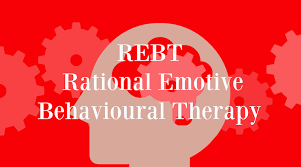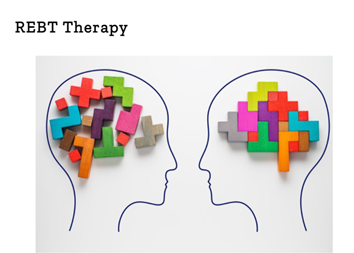Rational emotive behavior therapy is a way to solve problems. It means that we can change how we feel by changing what we think. Albert Ellis founded this thing in 1955. He said people cannot control what happens to them, but they can control how they react. REBT helps people understand themselves and their emotions more clearly. This helps them make decisions.
Contents
- 1 What is Rational Emotive Behavior Therapy?
- 1.1 How Does Rational Emotive Behavior Therapy Work?
- 1.2 Benefits of Rational Emotive Behavior Therapy
- 1.3 Positive Impact Of Rational Emotive Behavior Therapy
- 1.4 Negative Impact Of Rational Emotive Behavior Therapy
- 1.5 Core Principles
- 1.6 Techniques Of REBT
- 1.7 Role Of A Therapist In Rational Emotive Behavior Therapy
- 2 Conclusion
What is Rational Emotive Behavior Therapy?

Rational emotive behavior therapy is a cognitive-behavioral approach to psychotherapy. It was founded by Albert Ellis in 1955 and emphasizes the role of irrational thoughts in emotional disturbance. REBT helps people identify, challenge, and replace irrational thoughts with more rational ones.
How Does Rational Emotive Behavior Therapy Work?
REBT is based on the idea that humans are not rational beings. We all have irrational thoughts and beliefs that lead to emotional disturbance. REBT helps people identify these thoughts and beliefs, challenge them, and replace them with more rational ones. This can help reduce or eliminate emotional distress.
If you think that REBT could be helpful for you, your best bet is to find a therapist who practices it. You can also find self-help materials online or in bookstores. However, it’s important to note that self-help materials are no substitute for professional help. If you’re experiencing significant emotional distress, please seek out professional assistance.
Benefits of Rational Emotive Behavior Therapy
REBT is an extremely popular form of therapy. It has been studied extensively and shown to be effective for a variety of psychological problems, including
Depression

A review of 16 studies on REBT found that it was just as effective as cognitive-behavioral therapy (CBT) in treating depression. In some cases, these results were better than CBT alone.
Anxiety
Several studies have looked at the effects of REBT treatment on anxiety. One study looked at different ways to treat people with social anxiety. This study compared traditional psychotherapy groups with REBT and CBT. The participants had significant improvement after 12 weeks and even greater benefits after 15 months. Another study gave participants with social anxiety disorder either REBT or CBT. They found that both treatments were equally effective, although there was a slight advantage for the group who received CBT.
Anger management issues

Anger management issues are another problem that often responds well to rational emotive behavior therapy (REBT). One study looked at anger among people who had experienced traumatic events such as abuse, assault, accident victims, etc. The researchers compared traditional psychotherapy (CT) or rational emotive behavior therapy (REBT). Those in the REBT group had significantly better anger management outcomes than those who received traditional psychotherapy.
Relationship problems

Some studies are suggesting that people may benefit from REBT treatment for relationship issues. A study looked at how people react to infidelity. They also compared it to how they would feel if they got different types of training on their feelings. Researchers have found that all three kinds of treatment were helpful. But there was a big advantage for people who did the REBT intervention over those who did insight-oriented marital counseling.
Self-esteem issues

People with low self-esteem can also benefit from REBT treatment. One study found that people who received REBT had higher self-esteem than those who did not. The benefits of REBT seem to last over time, as well. In another study, researchers looked at the effects of CT and REBT on self-esteem in patients with bulimia nervosa. They found that both CT and REBT were effective treatments, but that there was a slight advantage for those who received REBT.
So far, we’ve seen how rational emotive behavior therapy (REBT) can be helpful for a variety of psychological problems and mental health issues.
Positive Impact Of Rational Emotive Behavior Therapy
Rational emotive behavior therapy is known to have a positive impact on individuals. The therapy helps decrease anxiety, depression, and stress levels. It can also help improve self-esteem and coping skills. Additionally, the therapy can be beneficial for reducing anger and aggression. For these reasons, rational emotive behavior therapy is often recommended for individuals who struggle with emotional and behavioral issues.
Negative Impact Of Rational Emotive Behavior Therapy
Although rational emotive behavior therapy has many benefits, it can also have negative consequences. The therapy can be emotionally draining and cause distress in some cases. Additionally, the focus on logic and reason can lead to a disconnection from emotions, which can be harmful in the long run. If you want to do rational emotive behavior therapy, it is important to work with a qualified therapist. You don’t want any negative impacts like that.
Despite its few drawbacks, rational emotive behavior therapy is an extremely effective psychological treatment that has a range of positive outcomes. If you are struggling with emotional behavioral problems, this could be the right treatment for you.
Core Principles
- Rational emotive behavior therapy is a type of psychotherapy that changes people’s negative or irrational beliefs into more rational ones. REBT has been around for decades and was first developed by psychologist Albert Ellis.
- Most modern forms of cognitive-behavioral therapies are based in large part on the principles behind this approach, as well. REBT is the way to fix your thoughts. When bad things happen to you, it can make you feel bad sometimes. But when you think about it differently, it might make you feel better. We might say “I can’t stand it!” when we don’t like something that is happening. We should use our minds and be open to what is happening. This causes us unnecessary pain because we fight against whatever happened instead of letting it be.
- Lastly, one of the key goals of REBT is to help people become more rational in their thinking and to teach them how to dispute their irrational beliefs. This is done through a variety of exercises and techniques that help you find out what other people think.
Techniques Of REBT

Some common techniques used in REBT include:
- Teaching clients how to identify their irrational thoughts and beliefs. This means to have people write down what they are thinking, and how it makes them feel.
- Exposing clients to rational responses. This is a way to show people how to react to a situation that made them upset. People can know what they should do if they are rational.
- Helping clients dispute their irrational beliefs: This is about making people think. You may ask them questions to get them to see things more clearly.
- Encouraging self-acceptance: This helps people learn to be nice to themselves, even when things go wrong.
- Teaching coping skills: These are skills that can help people healthily manage difficult emotions.
- Providing support and encouragement: The therapist’s role is to help people see their life in a better way. They will support them when they are doing things that are good for them.
- Challenging those thoughts and beliefs using evidence and logic: You can use REBT to change your thoughts and beliefs when you have evidence and logic. You can use it in many different situations. This helps to break the cycle of irrational thinking and can lead to significant improvements in emotional health.
- Helping clients develop new, more rational ways of looking at situations: This means that people can look at things in different ways. They can do more than one thing, too.
- Encouraging clients to practice tolerance for uncertainty and discomfort: This means that people can learn to accept that life is unpredictable. People might feel uncomfortable or uncertain, but this is okay.
- Teaching clients how to accept themselves unconditionally: This helps people to learn to be kinder to themselves, even when they make mistakes.
Rational emotive behavior therapy is not always easy, but it can be helpful when combined with other therapies. Some types of CBT are very similar to REBT, which is a good thing. It means that they go well with the treatment.
Role Of A Therapist In Rational Emotive Behavior Therapy

The therapist’s role is to help clients develop a healthier perspective on life and to support them in their efforts. This means you can talk to people about their opinion. You give them evidence and logic and help them understand new ways of looking at things. The therapist also encourages clients to accept themselves unconditionally, which can lead to improvements in their emotional health.
Conclusion
Hopefully, these examples will give you a better idea of how REBT can be utilized in everyday life. If you want to learn more about this topic, or if you have emotional problems, talk to your doctor. They can help you decide on the right treatment.
If you are looking for affordable Online Counseling MantraCare can help: Book a trial therapy session



